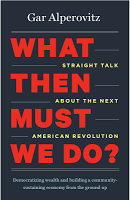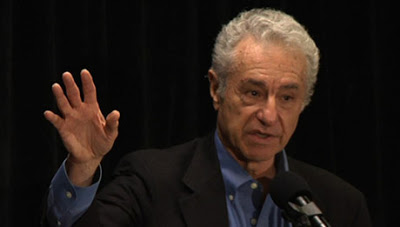Rag Radio podcast:
Political economist Gar Alperovitz,
author of ‘What Then Must We Do?’
“Like a picture slowly developing in a photographer’s darkroom, the potential elements of a new system, of something meaningful and very American, are beginning to emerge.” — Gar Alperovitz
By Rag Radio | The Rag Blog | May 30, 2013
Political economist Gar Alperovitz, whose new book is What Then Must We Do?: Straight Talk About the Next American Revolution, was our guest on Rag Radio, Friday, May 10, 2013. Rag Radio is a syndicated radio program produced at the studios of KOOP 91.7-FM, a cooperatively-run all-volunteer community radio station in Austin, Texas.
Listen to or download our interview with Gar Alperovitz here:
On the show, Alperovtitz talks with host Thorne Dreyer and The Rag Blog‘s Roger Baker about issues raised in his new book, What Then Must We Do?.
In the book, Alperovitz speaks about “why the time is right to democratize the ownership of wealth to strengthen our communities and our nation, through local cooperatives, worker-owned companies, and independent business, as well as larger publicly-owned enterprises and reinvigorated institutions.”
Alperovitz told the Rag Radio audience that “we are living in a systemic crisis, not simply a political crisis… You see that the long, long trends — for 30 years or more — simply don’t much change if you elect this politician or that politician.”
“Over the last 30 years,” he said, “real wages for most people have simply not moved up or down more than a few pennies. The top one percent has increased its income share over that 30-year span, from 10 percent to more than 20 percent. Over 30 years the top 1 percent has taken just about all of the gains of the economic system.”
And, he added, “That’s extraordinary.”
The new book, he says, documents “trend after trend after trend where the big picture keeps getting worse — or nothing gets better. Poverty increases, the incarceration rate has gone up dramatically… CO2 production has gone up 30 percent… On many many fronts, the trends don’t much change, and things get worse, and that tells you that something deeper in the system is at work.”
“And,” Alperovitz said, “I don’t think its going to change until we actually begin slowly but steadily evolving… and moving towards what can only be called a different system in the United States, something different from corporate capitalism. And certainly different from state socialism or communism. Something that has an American flavor and development.”
“And,” he added, “the book suggests that, partly because of the pain levels, and because things aren’t working for people, if you look closely there’s a lot of developments that are going in a new direction. And a lot that the press certainly doesn’t report on.”
 Alperovitz believes that many encouraging things are happening largely under the radar in this country, including the burgeoning workers’ cooperative movement and other public experiments that are addressing democratization of the economy.
Alperovitz believes that many encouraging things are happening largely under the radar in this country, including the burgeoning workers’ cooperative movement and other public experiments that are addressing democratization of the economy.
“Like a picture slowly developing in a photographer’s darkroom, the potential elements of a new system, of something meaningful and very American, are beginning to emerge,” he writes.
According to Daniel Ellsberg, “For decades, Gar Alperovitz has been at the forefront of attempts to understand what could lie beyond our increasingly broken system of corporate capitalism,” and his new book “offers by far the most serious, intellectually grounded strategy for system-changing yet to appear.”
University of Texas economist James Galbraith calls Alperovitz’s book a “cooperative and democratic manifesto,” and says, “May his ideas and ideals flourish.”
And Bill Fletcher Jr. wrote in a review of What Then Must We Do?, published on The Rag Blog, that Alperovitz “proceeds to identify actual examples of different struggles and projects that have been undertaken by progressives that show that a different way of organizing life and the economy is not only a great idea, but living reality.”
Fletcher writes that, “The reforms proposed are both clear and compelling and, in many cases, achievable.”
But he also suggests that Alperovitz’s strategy as incomplete: “The struggle for structural reforms and survival presented by Alperovitz is essential in cornering the political Right and changing the ‘common sense’ of the U.S. political arena. But it is not enough to wound the rabid beast; one must ultimately bring it down.”
According to Fletcher, “Alperovitz’s platform is at best one component in a much more long-term socialist strategy.”
Gar Alperovitz has had a distinguished career as a historian, political economist, activist, writer, and government official. He is currently the Lionel R. Bauman Professor of Political Economy at the University of Maryland; was co-founder of the Democracy Collaborative; and is a former Fellow of Kings College, Cambridge University, Harvard’s Institute of Politics, and the Institute for Policy Studies; and a Guest Scholar at the Brookings Institution.
He is the author of critically acclaimed books including America Beyond Capitalism and The Decision to Use the Atomic Bomb, and his articles have appeared in The New York Times, the Washington Post, The Los Angeles Times, the New Republic, The Nation, and the Atlantic, among other popular and academic publications.
Also see Roger Baker’s review of Alperovitz’s earlier book, America Beyond Capitalism, at The Rag Blog, and listen to the podcast of our February 3, 2012, Rag Radio interview with Gar Alperovitz.
Rag Radio is hosted and produced by Rag Blog editor and long-time alternative journalist Thorne Dreyer, a pioneer of the Sixties underground press movement.
The show has aired since September 2009 on KOOP 91.7-FM, an all-volunteer cooperatively-run community radio station in Austin, Texas. Rag Radio is broadcast live every Friday from 2-3 p.m. (CDT) on KOOP and is rebroadcast on Sundays at 10 a.m. (EDT) on WFTE, 90.3-FM in Mt. Cobb, PA, and 105.7-FM in Scranton, PA.
The show is streamed live on the web by both stations and, after broadcast, all Rag Radio shows are posted as podcasts at the Internet Archive.
Rag Radio is produced in association with The Rag Blog, a progressive Internet newsmagazine, and the New Journalism Project, a Texas 501(c)(3) nonprofit corporation. Tracey Schulz is the show’s engineer and co-producer.
Rag Radio can be contacted at ragradio@koop.org.
Coming up on Rag Radio:
THIS FRIDAY, May 31, 2013: Philosophy scholar Bill Meacham, author of How to Be an Excellent Human.
Friday, June 7, 2013: Mother Jones correspondent Tom Philpott on agricultural sustainability and the “Politics of Food.”



















As a taxpayer, I only have one desire for the usually inefficient, often corrupt, and maddeningly bureaucratic governments that line up to take money from my pocket. Please do your business as cost effectively as possible. I really dont want you to buy from some small company (Celeveland) in order to effect some social change that you deem worthy. I have already seen the outcomes of that in bloated pension obligations and crazy worker perks in union states.
I dont care where you purchase from, as long as you provide the best service at the lowest cost.
If you dont think that matters, then go start a business, pour your life into it, and then find that you are shut out of a business opportunity because you have the wrong politics or social view.
Its fun to hear all this talk about socialism and how to change capitalism. But its much ado about nothing. Makes for an interesting academic discussion, but it has no affect on the real world.
– Extremist2TheDHS
The new direction requires a fundamental change in the idea of why people start a business. Take cleveland as an example mentioned in the interview.
If there is an external requirement that purchasing be done from local suppliers, rather than at the best quality+lowest price,